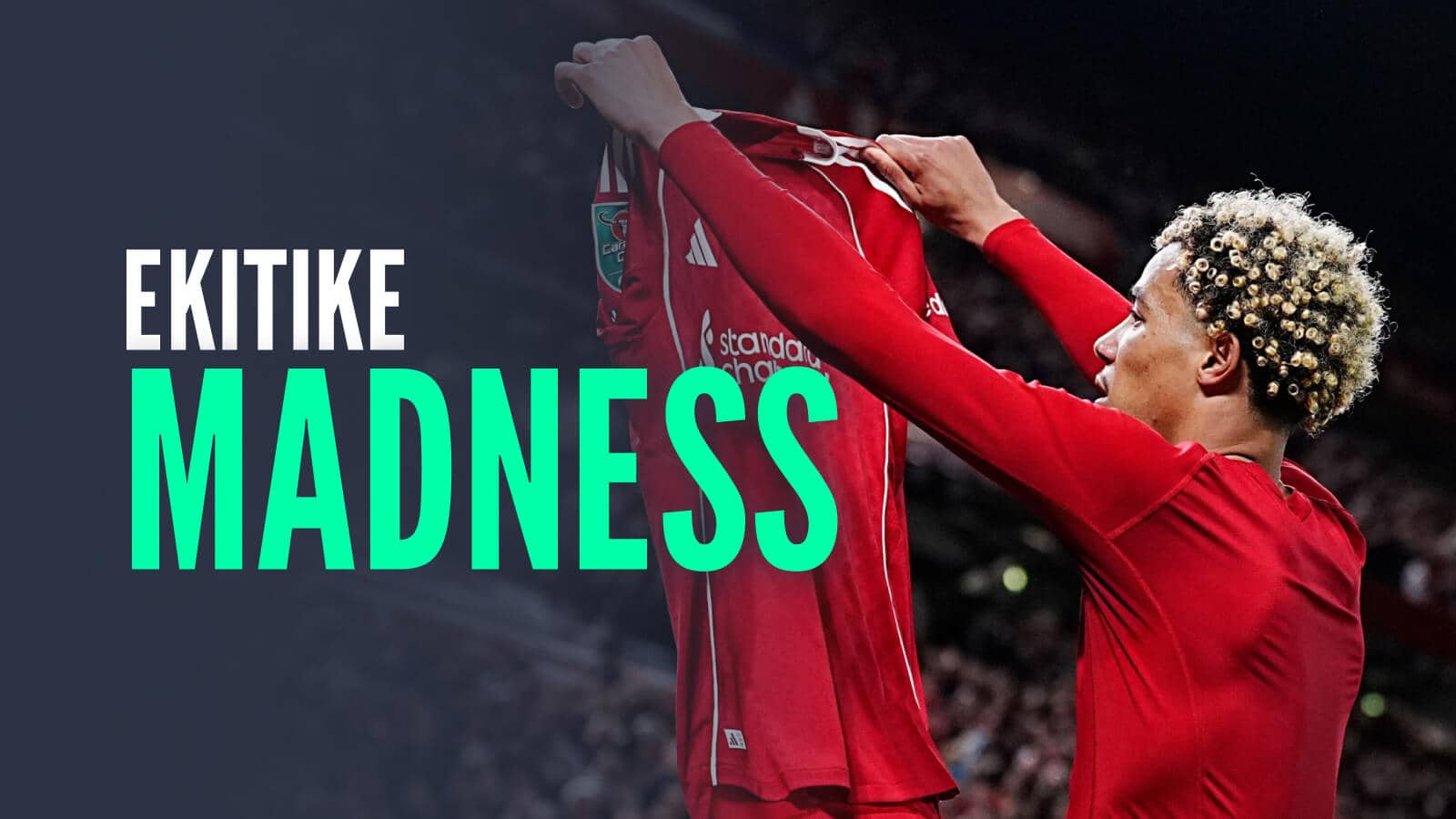The numver if games Hugo Ekitike will miss finally revealed

Football is full of unpredictable drama. A game that looks simple on the surface—two teams, one ball, goals to be scored—can quickly turn into a theatre of madness. That is what happened at Anfield when Liverpool faced Southampton in the Carabao Cup third round. What should have been a routine night of celebration turned into chaos when Hugo Ékitiké, the young French striker who had just delivered the winning goal, became the hero and the villain in the space of a few seconds.
The story of Ékitiké’s bizarre red card is one that Liverpool fans will talk about for a long time. It was not just about scoring and celebrating. It was about how a small moment of emotion can spiral into disaster. Yet, at the same time, it was also about how a club, its players, and its manager chose to handle the fallout. Because in the end, Liverpool made a decision that revealed just how much trust they already have in their new forward.
It was September 23, 2025, a cool evening in Liverpool. The Carabao Cup was not the biggest trophy on offer, but it still mattered. For Liverpool, it was another chance to give new signings minutes, to rest some stars, and to continue building the squad under new manager Arne Slot.
Southampton, as always, came to fight. They are a club that never backs down, and the match was not easy. Liverpool had to dig deep, and the crowd had to stay patient. The game swung back and forth, with both sides having chances. But when the clock ticked towards the final 20 minutes, one man stepped forward to make the difference: Hugo Ékitiké.
The French striker had been signed with excitement but also with questions. Could he handle the pressure of Liverpool? Could he score goals at Anfield the way the legends before him had done? On this night, he gave his answer. He struck the decisive second goal, a finish full of power and precision. Anfield roared
Ékitiké, full of emotion, ripped off his shirt in celebration. It was a pure, human moment. Every football fan knows that feeling—scoring a goal, especially a match-winner, is a rush of adrenaline unlike anything else. The shirt came off, he screamed with joy, the crowd responded.
But in football, joy often comes with rules. Removing your shirt is an automatic yellow card. The referee Thomas Bramall reached into his pocket and showed Ékitiké the yellow. That in itself would have been nothing unusual—players get booked for this all the time.
The problem was that Ékitiké already had a yellow card. Earlier in the match, frustration had gotten the better of him. He had been penalized for dissent after angrily throwing the ball away when a foul was called against him. That first yellow card now came back to haunt him. Two yellows equal one red.
And just like that, Ékitiké went from hero to villain. One second he was the match-winner, the man who gave Liverpool victory. The next, he was walking off the pitch, head down, leaving his teammates to fight the final ten minutes with only ten men
The Liverpool players could hardly believe what they had just seen. The crowd, still buzzing from the goal, now erupted in confusion and anger. How could their match-winner be sent off for celebrating? How could such a rule exist that punished joy in such a cruel way?
Arne Slot, on the touchline, shook his head in disbelief. The Dutchman had already seen his team’s season produce twists and turns, but this was new even for him. After the game, he did not hide his frustration. He called Ékitiké’s actions “needless and stupid.”
Slot’s words were harsh but honest. He knew Liverpool had survived the game and won 2-1, but he also knew it could have ended differently. Playing the last minutes with ten men put unnecessary pressure on his side. He wanted Ékitiké to learn from the mistake.
In the hours after the game, stories began to circulate. Reports claimed that Ékitiké had been fined two weeks’ wages by the club. It was believable—football clubs often punish players who get sent off for careless reasons. Fans debated on social media, some saying he deserved the punishment, others saying he had only acted out of passion.
But then the truth came out. Foot Mercato reported that Liverpool had not punished him at all. No fines. No suspensions from training. No extra punishment beyond the red card itself.
For Liverpool, this was a statement of faith. They had decided to support their young striker instead of disciplining him further. It was a show of trust, a message that said: Yes, you made a mistake. But we still believe in you.
There are many reasons Liverpool may have taken this decision.
First, Ékitiké is new to the club. He is still adjusting to life at Anfield, still trying to win over the fans and his teammates. Punishing him harshly might have hurt his confidence. By forgiving him, the club made it clear that they see the bigger picture.
Second, the red card did not cost Liverpool the result. The team still held on to win 2-1. Had they lost the match because of his dismissal, perhaps the story would have been different. But since they survived, there was no need to make things worse.
Third, and maybe most importantly, Liverpool know that Ékitiké is an emotional player. Passion is part of his game. It is what drives him, what makes him dangerous, what makes him exciting. To punish that too harshly might risk killing the very fire that makes him special.
Among the fans, opinions were mixed. Some agreed with Slot, calling Ékitiké’s actions silly and immature. They pointed out that he should have known better, that players at the highest level must control their emotions. Others defended him, saying football is nothing without passion. They argued that nobody should be punished for celebrating with joy, and that the rule itself is outdated.
What united them all, however, was the belief that Ékitiké will learn. He is only 23, still young, still growing. Mistakes are part of the journey. And in Liverpool, he has the perfect environment to learn from the
For Ékitiké, this incident could become a turning point. Every footballer faces moments of embarrassment, moments they wish they could erase. But those moments often become lessons that shape careers.
The Frenchman now knows that the eyes of the world are on him. He knows he cannot let emotions cost his team again. But he also knows he has the support of his club. That combination—discipline and trust—could help him grow into the striker Liverpool believe he can become.
Liverpool fans have seen this story before. Luis Suárez was once wild and uncontrollable, but he became a legend. Sadio Mané was fiery and emotional, but he matured into one of the best forwards in the world. Ékitiké has the same chance
Ékitiké’s red card also reignited a debate in football: should players be booked for taking their shirts off when celebrating?
For many fans, the rule makes no sense. Football is an emotional game, and scoring a goal is the ultimate moment of joy. Why should a player be punished for expressing that joy? Why should a celebration ruin a game?
The rule was created years ago, partly for reasons of respect, partly to avoid delays, and partly to discourage political or offensive messages on undershirts. But in cases like Ékitiké’s, it feels harsh, even cruel.
Perhaps football authorities will one day revisit this rule. Because moments like this remind everyone that sometimes the game punishes passion instead of rewarding it
The story of Hugo Ékitiké’s bizarre red card will go down as one of the strangest incidents of Liverpool’s season. One moment of passion turned into embarrassment, one celebration into a dismissal. Yet, at the same time, it revealed something important about Liverpool as a club.
Instead of punishing him, they chose to forgive. Instead of making him feel isolated, they chose to bring him closer. That decision may prove more valuable than any fine. Because in football, as in life, mistakes are not the end. They are opportunities to grow.
Ékitiké will return from his suspension stronger. He will remember that night at Anfield not only for the goal he scored, but for the lesson he learned. And when he scores again, when he hears Anfield roar his name, he will know to keep his shirt on—but he will also know that Liverpool still believe in him.
And maybe, just maybe, that belief will turn him into the hero the club always hoped he would be















